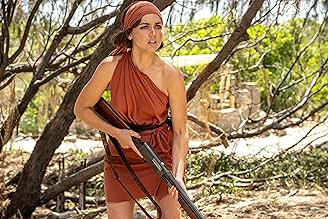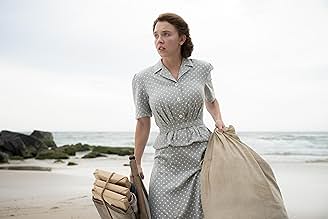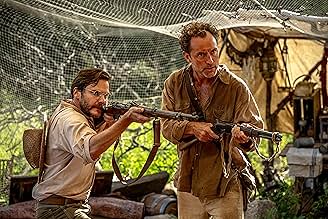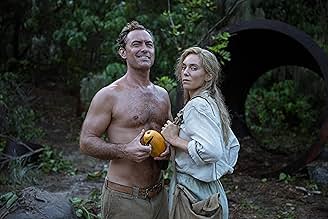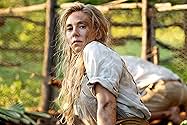Un grupo de personas impulsadas por un profundo deseo de cambio; para dar la espalda a la sociedad lo dejan todo atrás y fijan su futuro en el duro paisaje de las Galápagos.Un grupo de personas impulsadas por un profundo deseo de cambio; para dar la espalda a la sociedad lo dejan todo atrás y fijan su futuro en el duro paisaje de las Galápagos.Un grupo de personas impulsadas por un profundo deseo de cambio; para dar la espalda a la sociedad lo dejan todo atrás y fijan su futuro en el duro paisaje de las Galápagos.
Daniel Brühl
- Heinz
- (as Daniel Bruehl)
Benjamin Gorroño
- Governor's Translator
- (as Benjamin Gorrono)
Nicholas Burton
- Hancock Crew
- (sin créditos)
Austin Hayden
- American Sailor
- (sin créditos)
Opiniones destacadas
A great story, great cast and performances.
A good movie is a movie that makes you want to watch more, think more, understand more. This is one of those.
The characters are based on real people and real events yet it feels like getting introduced to those events first hands.
Obviously there is quite a lot of over-dramatization but it serves the story well.
Watch advice: Recommended.
A good movie is a movie that makes you want to watch more, think more, understand more. This is one of those.
The characters are based on real people and real events yet it feels like getting introduced to those events first hands.
Obviously there is quite a lot of over-dramatization but it serves the story well.
Watch advice: Recommended.
I went into this movie blind, it was a Monday Mystery Movie at Regal.
It's a philosophical journey of the human condition and the troubles that we have with each other. As the story unfolds you could definitely find something in it that resonates with the way you see the world. Finding out that this was based on a true story makes me want to read the two perspectives of what happened on the island. Not a bad movie, I think the critics might have been too critical of the movie.
It's a philosophical journey of the human condition and the troubles that we have with each other. As the story unfolds you could definitely find something in it that resonates with the way you see the world. Finding out that this was based on a true story makes me want to read the two perspectives of what happened on the island. Not a bad movie, I think the critics might have been too critical of the movie.
"Eden" focuses on a group of mostly German citizens who attempt to settle Floreana, an uninhabited island in the Galapagos after World War I. Their aim for a slice of paradise does not go as planned.
Noah Pink's screenplay for the film is based on a true story (adapted from conflicting accounts written by two of the people who lived it) that almost seems unbelievable at times, except it's not--in fact, most of the details here are historically accurate, down to the individuals' names, characterizations, and, more or less, the series of events that transpired. With that context in mind, it is worth noting that the events depicted here are perhaps not as outlandish as they may seem.
The film is directed by Ron Howard, who is known for his glossy big-budget films, and in that regard, "Eden" does not deviate too far from the director's norm, though the material is notably darker than the kind of fare Howard typically tackles. As often grey and drab is it looks, the film is well-shot and has an epic sort of look about it that audiences have come to expect from him.
Where the film perhaps suffers a bit is in the "movie magic" elements of a production like this, where the nitty gritty realities and sheer difficulty of homesteading on such an island feel glossed over at times. The actors often appear too clean, too rested (which for at least one of them, I suppose, makes senses) and too primped. This is a fine line to balance, as overindulging in the mintutaeua of homesteading and working a tropical landscape like this could become tedious, but a certain amount of it is necessary for the viewer to buy into the circumstances. There is never a significant sense that these people will succumb to the landscape-only to each other-and perhaps that may be the point.
The performances here are largely strong, with Jude Law and Vanessa Kirby playing the intellectual quasi-hippies who were the first to land on this hallowed ground. Daniel Brühl and Sydney Sweeney play a husband-and-wife who arrive and prove to be superior settlers with the the fundamental skills necessary to work the land; while they dedicate their bodies to harnessing the natural resources, the egomaniacal Law pontificates and philosophizes (obsessively quoting Nietzsche and other philosophers) his way through circumstances, with Kirby lending an effective performance as his multiple sclerosis-stricken lover. Ana de Armas gives an outrageous, campy turn as a self-described Baroness who lands on Floreana with grand ideas and a Clara Bow-esque posture, but no real means (intellectual, physical, or otherwise) of achieving any such fantasies. Instead, she utilizes her own sociopathy and manipulation tactics in a diabolical quest for control. I suspect that most of the performances here could be cited by some critics for overacting, but when stacked against the historical record, these depictions of such extreme personalities don't actually seem to be that far from the truth of who these individuals were. Sweeney and Brühl are perhaps the most believable simply because their characters are the most relatable, and their salt-of-the-earth nature prove to be a great asset in this conflict of personalities.
Even for those not familiar with the actual story, there is some predicability here in terms of what will play out, but the funeral procession marches on in a manner that is no less engaging and attention-getting. In some regards, I think audiences will simultaneously expect more and less from this film. It never quite reaches the fever pitch we want, and yet the result remains largely satisfying. As with the performances, I suspect many of the critiques here will hinge on the mere facts of the story. Are these people outrageous? Yes. Does the story at times seem far-fetched? Sure. But as the old adage goes, oftentimes truth is stranger than fiction. 7/10.
Noah Pink's screenplay for the film is based on a true story (adapted from conflicting accounts written by two of the people who lived it) that almost seems unbelievable at times, except it's not--in fact, most of the details here are historically accurate, down to the individuals' names, characterizations, and, more or less, the series of events that transpired. With that context in mind, it is worth noting that the events depicted here are perhaps not as outlandish as they may seem.
The film is directed by Ron Howard, who is known for his glossy big-budget films, and in that regard, "Eden" does not deviate too far from the director's norm, though the material is notably darker than the kind of fare Howard typically tackles. As often grey and drab is it looks, the film is well-shot and has an epic sort of look about it that audiences have come to expect from him.
Where the film perhaps suffers a bit is in the "movie magic" elements of a production like this, where the nitty gritty realities and sheer difficulty of homesteading on such an island feel glossed over at times. The actors often appear too clean, too rested (which for at least one of them, I suppose, makes senses) and too primped. This is a fine line to balance, as overindulging in the mintutaeua of homesteading and working a tropical landscape like this could become tedious, but a certain amount of it is necessary for the viewer to buy into the circumstances. There is never a significant sense that these people will succumb to the landscape-only to each other-and perhaps that may be the point.
The performances here are largely strong, with Jude Law and Vanessa Kirby playing the intellectual quasi-hippies who were the first to land on this hallowed ground. Daniel Brühl and Sydney Sweeney play a husband-and-wife who arrive and prove to be superior settlers with the the fundamental skills necessary to work the land; while they dedicate their bodies to harnessing the natural resources, the egomaniacal Law pontificates and philosophizes (obsessively quoting Nietzsche and other philosophers) his way through circumstances, with Kirby lending an effective performance as his multiple sclerosis-stricken lover. Ana de Armas gives an outrageous, campy turn as a self-described Baroness who lands on Floreana with grand ideas and a Clara Bow-esque posture, but no real means (intellectual, physical, or otherwise) of achieving any such fantasies. Instead, she utilizes her own sociopathy and manipulation tactics in a diabolical quest for control. I suspect that most of the performances here could be cited by some critics for overacting, but when stacked against the historical record, these depictions of such extreme personalities don't actually seem to be that far from the truth of who these individuals were. Sweeney and Brühl are perhaps the most believable simply because their characters are the most relatable, and their salt-of-the-earth nature prove to be a great asset in this conflict of personalities.
Even for those not familiar with the actual story, there is some predicability here in terms of what will play out, but the funeral procession marches on in a manner that is no less engaging and attention-getting. In some regards, I think audiences will simultaneously expect more and less from this film. It never quite reaches the fever pitch we want, and yet the result remains largely satisfying. As with the performances, I suspect many of the critiques here will hinge on the mere facts of the story. Are these people outrageous? Yes. Does the story at times seem far-fetched? Sure. But as the old adage goes, oftentimes truth is stranger than fiction. 7/10.
Ron Howard is never afraid to explore new genres and here he definitely immerses you in the social experiment of posh post-war expats trying to make a way of life an island in the Galapagos. Unfortunately the vision of Dr. Ritter and his wife Sue Storm as well as the machinations of the Baroness along with the stresses of the environment prove too much for the bourgeois marriage of Margaret Wittmer (cutie Sydney again!) and her husband Daniel Bruhl. Still, the cast is gorgeous, the island indeed like a paradise from another era, and Howard reiterates yet again a lesson learned by every wannabe Robinson Crusoe and Hemingway in the 1920's: just find your favorite cafe in Paris, spend six weeks writing a novel about your friends which when they read will have them hating your guts, then thirty years later move to Cuba and create your own Eden. Those are your and my happy days.
Set in the Galápagos Islands, but filmed in Australia.
I was able to see the press conference that Ron Howard and the four main stars gave. Howard explained that he had the project in mind for a time, worked on it some during the recent COVID pandemic and lockdowns. He knew it would not be a project that a typical studio would go for so he went at it his way.
The movie is a fictional drama based on real people and their attempt to find their own Eden in the Galápagos Islands (filmed in Australia). It doesn't work out as hoped because, in the end, people are people and they can cooperate together for only so long.
This is analogous to the theme that played out in the year 2000 movie, "The Beach" with Leo Dicaprio. As I wrote in my comments for that one, "Even though these 20 or 30 men and women all went to the island for "pleasure seeking", ultimately roles need to be taken, duties accepted, not everyone agrees, jealousy starts to erode relationships, certain people seek power, and when some get seriously injured, "out of sight, out of mind" is the remedy so as not to upset "paradise." In other words, they end up creating on a smaller scale the same world that they sought to escape from. Eventually this "house of cards" starts to fall down, and ultimately everyone realizes paradise is internal, not some idyllic place."
Good for Howard to bring this story to the screen.
I was able to see the press conference that Ron Howard and the four main stars gave. Howard explained that he had the project in mind for a time, worked on it some during the recent COVID pandemic and lockdowns. He knew it would not be a project that a typical studio would go for so he went at it his way.
The movie is a fictional drama based on real people and their attempt to find their own Eden in the Galápagos Islands (filmed in Australia). It doesn't work out as hoped because, in the end, people are people and they can cooperate together for only so long.
This is analogous to the theme that played out in the year 2000 movie, "The Beach" with Leo Dicaprio. As I wrote in my comments for that one, "Even though these 20 or 30 men and women all went to the island for "pleasure seeking", ultimately roles need to be taken, duties accepted, not everyone agrees, jealousy starts to erode relationships, certain people seek power, and when some get seriously injured, "out of sight, out of mind" is the remedy so as not to upset "paradise." In other words, they end up creating on a smaller scale the same world that they sought to escape from. Eventually this "house of cards" starts to fall down, and ultimately everyone realizes paradise is internal, not some idyllic place."
Good for Howard to bring this story to the screen.
¿Sabías que…?
- TriviaSet in the Galápagos Islands, but filmed in Australia.
- ErroresIn a scene, Rudolph tells the truth about Baroness to Heinz and Margaret explaining how she is like a "Black Hole swallowing everything in her orbit". The theory which was first discovered only in 1958.
Selecciones populares
Inicia sesión para calificar y agrega a la lista de videos para obtener recomendaciones personalizadas
- How long is Eden?Con tecnología de Alexa
Detalles
Taquilla
- Total en EE. UU. y Canadá
- USD 1,519,579
- Fin de semana de estreno en EE. UU. y Canadá
- USD 1,048,374
- 24 ago 2025
- Total a nivel mundial
- USD 2,344,620
- Tiempo de ejecución
- 2h 9min(129 min)
- Color
- Relación de aspecto
- 2.39 : 1
Contribuir a esta página
Sugiere una edición o agrega el contenido que falta







